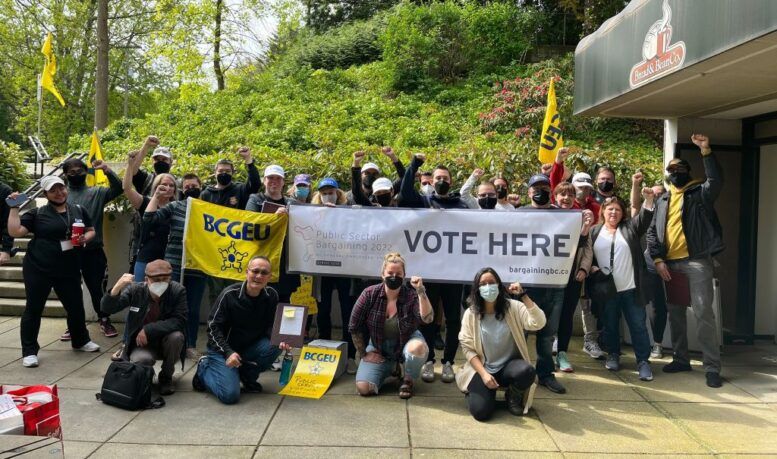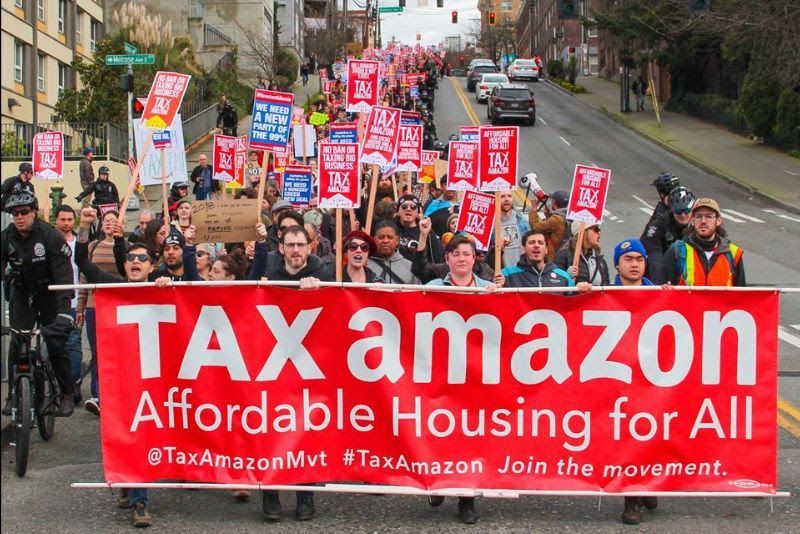Cost of Living Adjustment Needed
Overwhelmingly, 33,000 BC Government employees have voted with a 94.6 percent majority, for strike action as they try to get the NDP government to agree wages that maintain living standards. The union, BCGEU, had an extensive campaign to reach members on the issues and to vote, taking the campaign to workplaces across BC.
Inflation is soaring, rising 7.7 percent in May over May 2021 and the Bank of Canada is adding to the misery by putting up interest rates. Gas prices are up 48 percent over a year ago as the companies gouge workers. Inflation and interest rates will go higher before things get any better. In these circumstances the NDP government’s pay offer of a 2 percent a year increase for 3 years is a massive pay cut.
These workers, covered by BC’s Public Service Agency, are the first of 393,000 workers in BC’s public sector whose contracts are up for negotiation this year. Over the two and half years of the COVID emergency these workers were essential and kept services such as schools, hospitals, road, ferries and many more operating. They were often described as “heroes,” but now the government wants to cut their pay.
Who pays for inflation?
The government will argue that it can’t afford to pay for wage increases for everybody. But the reality is that the working class is always asked to pay the lion’s share of the burden when the capitalist economy falters. Rich executives and property owners saw their wealth and the value of their properties increase over the pandemic. Canadian billionaires increased their wealth by $78 billion in just the first year and yet these people are not being asked to pay more in any proportionate way. The government could afford to pay for across-the-board pay increases at the rate of inflation by increasing taxes on the wealthiest, who are in fact much better off today despite rising inflation.
Capitalist economists argue that wage increases that keep pace with inflation will lead to a wage-price spiral, as they claim that increased wages will lead to further increases in prices. But this is junk economics with no basis in reality. Prices are determined by the value of the product modified by supply and demand, not by the wages paid to workers. All else being equal, increasing wages can only lead to a decrease in profits, not an increase in prices, since a company that unilaterally raises prices will be undercut by competitors. It is a historical fact that price increases do not follow from wage increases.
BCGEU demands cost-of-living adjustment
The first union to advance in negotiations is the BC General Employees Union (BCGEU), which has 85,000 members. These members are grouped into six different collective agreements with the provincial government. Negotiations over the Main Public Service agreement, which covers 33,000 workers, stalled in March. The union called for a two-year contract with pay increases of 5 percent or the rate of inflation, whichever is higher. The BC NDP government refused to go any higher than pay increases of just 1.75 percent in the first year and 2 percent in the second, a massive cut in real wages.
Tying wage increases to the rate of inflation is a form of “cost-of-living” adjustment or COLA, which ensures that the real value of wages is not undermined by inflation. These clauses used to be common. Unifor Secretary-Treasurer Lana Payne reported that nearly half of unionized workers with contracts signed in 1980 were protected by a COLA. But the following decades saw an onslaught of neoliberal austerity to claw back the gains won by the labour movement, so that by 2014 only one percent of unionized workers in Canada had a COLA in their contracts. The widespread lack of any inflation protection today points to a major crisis for Canadian workers as inflation continues to accelerate.
Unity is strength for public sector workers
The negotiations for the Main Public Service agreement carry a huge weight for all public sector workers including other BCGEU members, teachers, nurses, post-secondary education workers, and others, because the government will use the Main Public Service agreement as the benchmark for all other contracts.
BCGEU’s president Stephanie Smith called for a strong strike vote to give the union negotiators a stronger position at the bargaining table. Immediately following the ballot results, the government asked to reopen negotiations. However, the strong strike vote may not be enough to win a good contract as government will want to limit wage increases in this contract and then use it as a basis for the other contracts covering the other 360,000 public service workers. All the public sector unions — BC Teachers Federation, CUPE, BC Nurses Union, Hospital Employees Union, Health Sciences Association, MoveUP, BC Ferries and Marine Workers’ Union, etc., should be campaigning together and be ready to come out to support the 33,000 workers involved in this strike vote.
Most public sector contracts have a “me too” clause that guarantees any wage increases or benefits won by other public sector workers are automatically included in all the others. These clauses are powerful tools that can be used to amplify the power of workers when there is a confident and militant labour movement. But when the labour movement is disorganized and defensive, they can change into their opposite and become a fetter on negotiations. The government can use them as part of a divide-and-rule tactic in which, by isolating subsets of workers one contract at a time, they can force a bad deal on all subsequent negotiations.
Unions that think that they can plead a special case for their members will come up empty handed. The only thing that will really force the provincial government to move is the united strength of all public sector workers and the support of people who rely on the services these workers provide. BCGEU should stick to its guns in demanding COLAs in their contracts, but also the other public sector unions should not be sitting on their hands waiting for the results of this negotiation. They should be organizing solidarity rallies and marches in support of BCGEU members and holding democratic discussions including with rank-and-file members of all unions about the possibility for united action.
Workers can look to the example of the 1972 Common Front in Québec. This was also during a period of high inflation in which the provincial government was demanding a wage freeze. The Common Front united public sector unions representing 84 percent of the public sector workforce. These 210,000 workers voted to strike collectively; they started with a 24-hour strike, escalating to a 10-day strike, and then in the face of reprisals from the government escalated to a week-long province-wide general strike of over 300,000 workers. Of course, such actions come with risks and 103 workers were arrested and faced fines and prison sentences. But the Common Front won incredible and lasting victories for the working class, including wage increases for 50,000 low wage workers, automatic cost-of-living increases, and better pensions and job security.
Rank-and-file members of BC’s public sector unions need to be aware that they have the power to win big, but they need to be well organized and have leadership that is willing to fight. Socialist Alternative has consistently called for all union officials to be elected regularly by members, subject to immediate recall, and that all officials and staff should receive the same wages as the workers they represent. This is the only way to guarantee that union leaders remain under the control of their members and that their interests remain aligned.
The fight for COLAs in a period of high inflation could be a stimulus for the Canadian labour movement and a catalyst for unionizing new layers of workers. Working people did not cause inflation, but they are being asked to pay for it while corporate profits soar. By standing together and building a mass protest movement backed up by well-organized strikes, BC public sector unions can ensure working people’s wages keep their value and that those who profited most pay for the cost of inflation.




